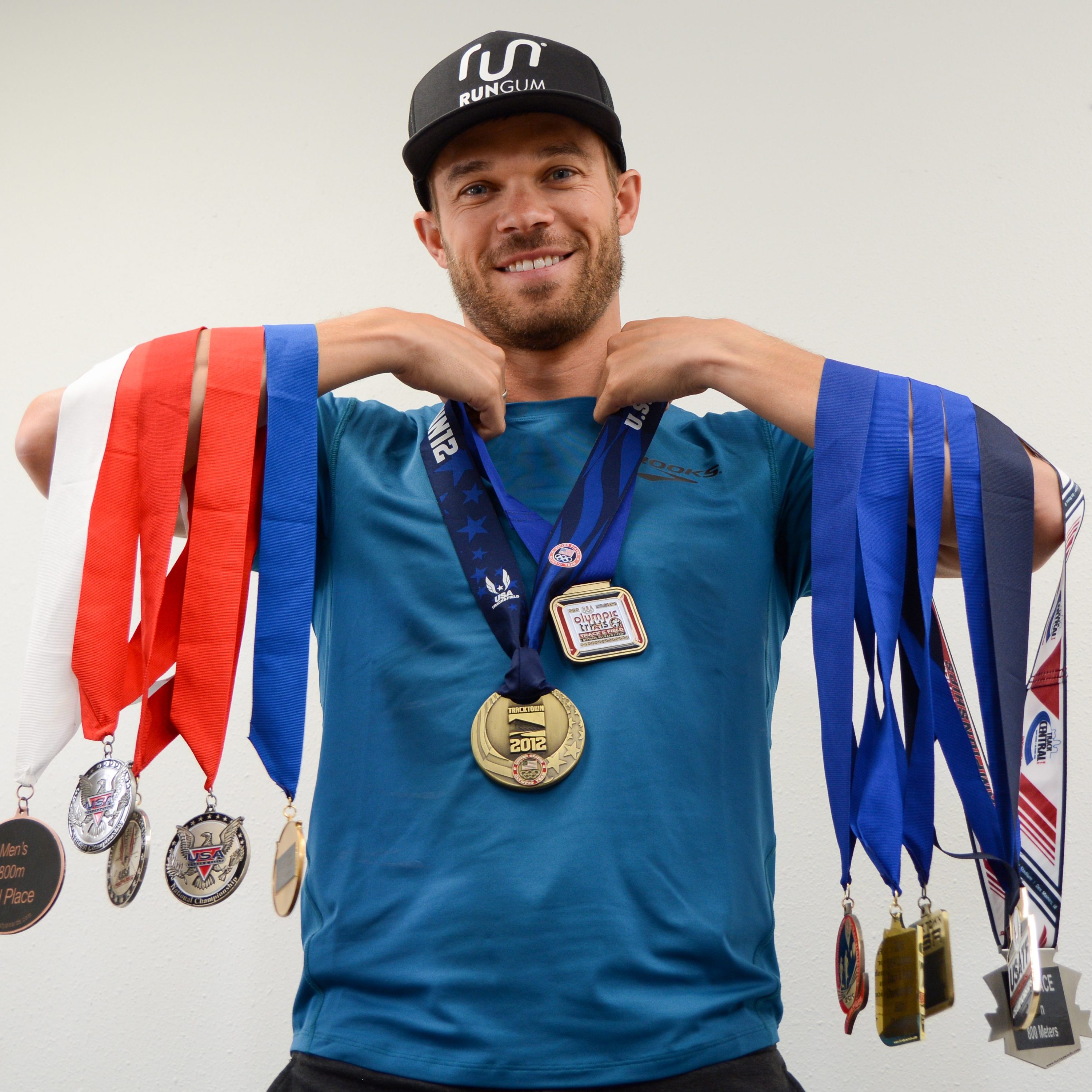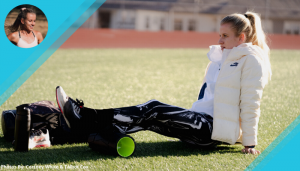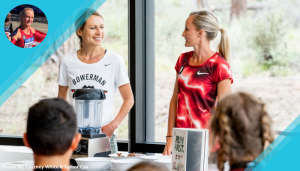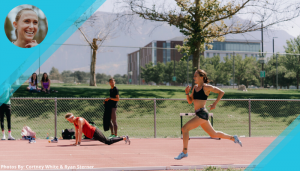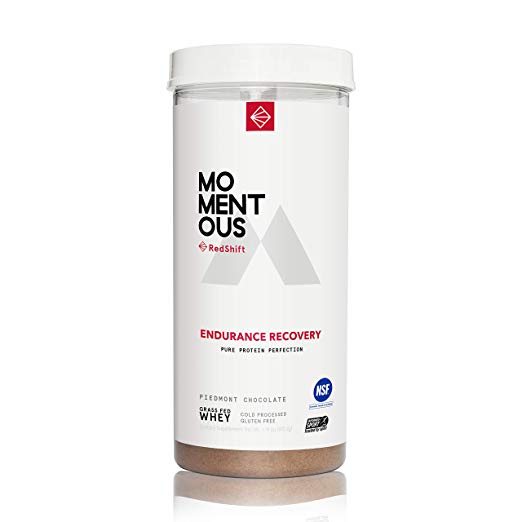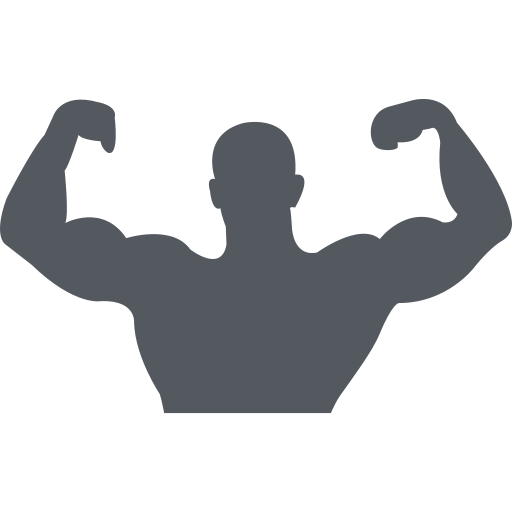
Recover Like: Olympian Nick Symmonds
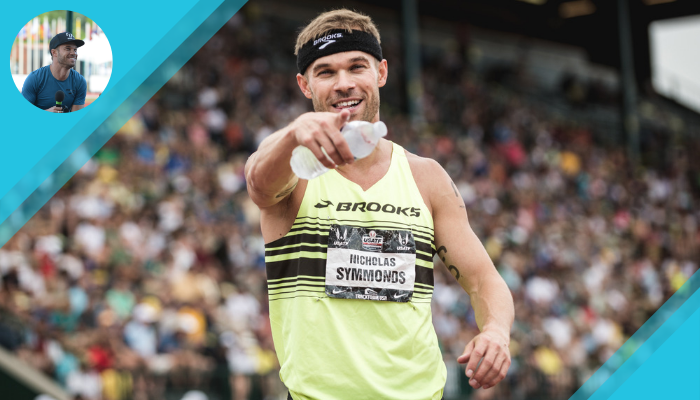
Share on facebook
Share on twitter
Share on pinterest
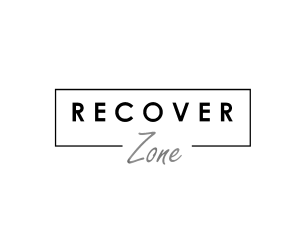
By: Recover-Zone Team
Our amazing team consist of a wide variety of writers, from novice athletes, to serious competitors. Competing in an array of fitness challenges.
Having the title of an Olympian, World Champion, or CEO are all incredible accomplishments in their own respects. To succeed at all three, nearly unheard of. Nick Symmonds did just that. One could say he has an impressive “track record”. Running in the 2008 Beijing Olympics and 2012 London Olympics, placing fifth in the 800m finals. On top of that Nick ran in 2009, 2011, and 2013 World Championships taking the silver medal in the last. Oh, and to add to that long list Nick is the creator and CEO of energy gum company Run Gum. Maybe you should listen to what he says.
In a world of cutting-edge laser treatments, top of the line cryo-chambers, and countless groundbreaking recovery techniques our interview with Nick Symmonds shows a different approach to the mayhem…simplicity. Staying true to his roots, the Boise native shares a back to the basics approach to the thriving industry of recovery. Everything from taking a dip in a river, to mentally refreshing with crap fishing. Nick shares with us the tips and insights that supported him through his successful running career.
What would a typical recovery day look like during your career?
My big session would be in the morning. Those workouts were usually 10, maybe even as many as 12 miles. The minute I finished; I would have a protein drink. Literary the second I finished the last step of my workout, I would start drinking a protein shake. I liked to use a protein called momentous. livemomentous.com is the website and they make a really high-quality whey protein. I actually mixed that in milk. I thought it tasted better and I like milk. After, I would have a big meal which was typically something healthy. I was not eating junk food and I was definitely trying to refuel with good food. Following that, I would go down for a 30 or 45-minute nap. At this point, I felt so tired physically and mentally. When I woke up, I would usually chew a pack of Run Gum. The caffeine in Run Gum has been shown to have good effects on recovery because it’s a vascular dilator. This allows you to pump more blood to your muscles. Also, the cognitive effects of the Run Gum would make me feel more alert and then I would work out again. Oftentimes I would try to get a massage at least once or twice a week when I could. I thought that really helped me bounce back between weeks and stay healthy. Then of course just a great night’s sleep. Usually, I would ice bath unless it was really cold outside, and I was worried about catching a cold.
How essential was recovery to your training?
It was absolutely critical. If you are going to train seven days a week, the only way to survive is to really focus on recovery. As a pro, we were doing three hard sessions a week, plus two lifts, two swims, and a long run. We were doubling almost every single day. We really had to focus on recovery. I think that I got better and better throughout my career as I made recovery a higher priority for myself. In high school, I probably didn’t focus on it as much as I did or should have later in my career.
What did you focus on for optimal recovery?
I think it starts the minute that you finished your last interval getting a proper warm down. I also really believe in and loved ice bathing. On top of that getting something in your stomach is huge. You need to have a protein shake or at least a power bar or something on hand, to get something in your stomach and start rebuilding muscle. Then afterward, getting a proper meal and massage can help. I like to swim after my really hard session too. If I did a really hard workout in the morning four or five hours later, I would go and swim an easy mile. I felt that swimming laps for about half an hour would move my blood around and get my left muscles loosened up. Being in that zero-gravity environment just made me feel so much better afterward. Lastly, I believe that getting a good night’s sleep is the number the one rule of training outside of getting the miles.
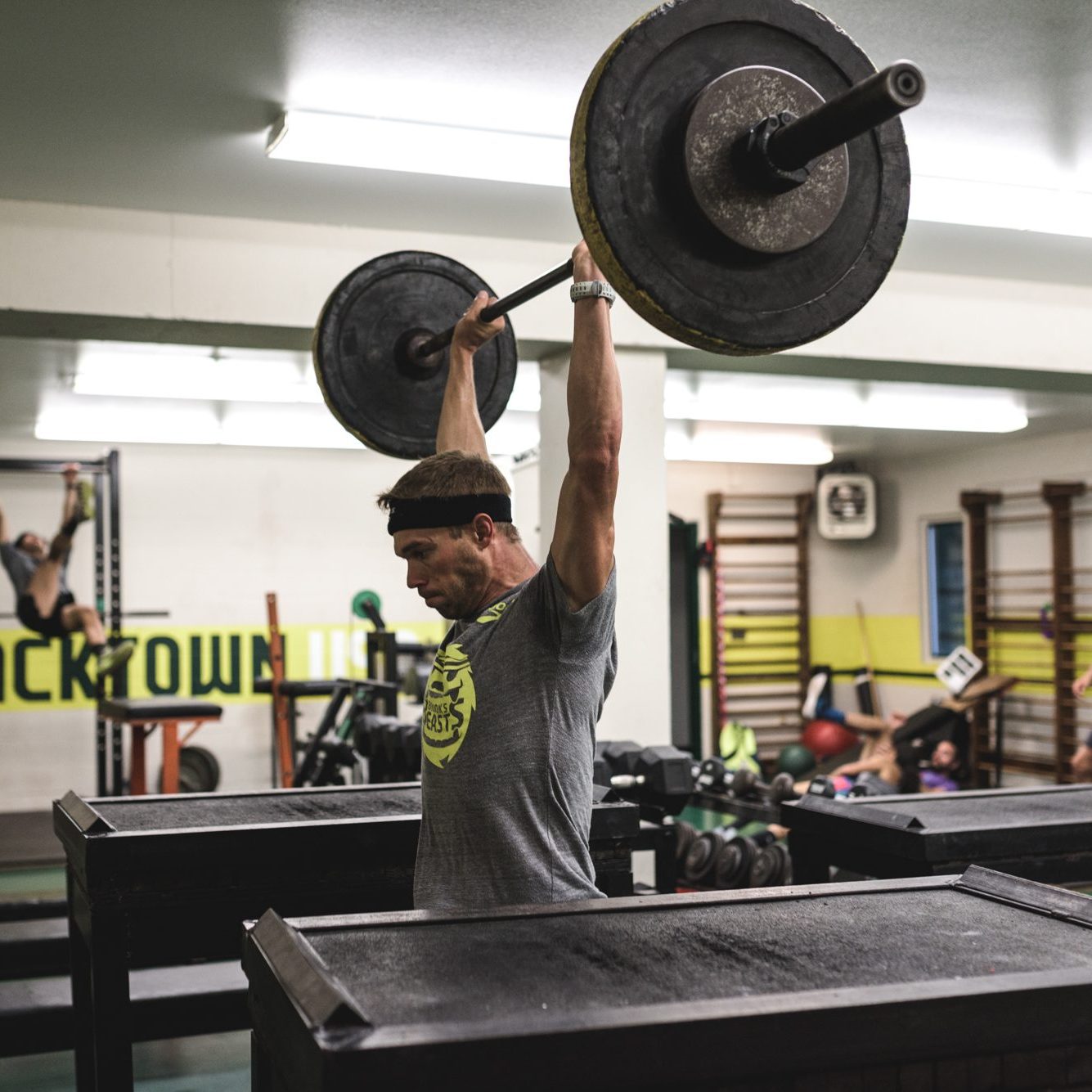
If you are going to train seven days a week, the only way to survive is to really focus on recovery.
Were you getting that much sleep through your entire career?
No, I wish I had in high school, I would have been a better runner if had I done that. Likewise, in College, of course, I was being pulled in a dozen different directions. Although, as a pro, I really made sleep a priority and it is one of the reasons I had such a long and successful career. It is that I said, “Hey, sleep is always going to come first.” If I am going to train this hard, I might as well be letting my body recover from it.
Why were you taking naps with so much sleep?
Most days I would get home about eleven or twelve and eat a big meal. Then I would try to take a 30 to 45-minute nap. After that, I bounced back up and would answer emails do podcasts or whatever was going on that day before my second training, which was in the afternoon. I always felt like that afternoon workout was a little better if I got at least 30 or 45-minute nap in after lunch.
Did the naps help you athletically recovery or mentally recovery?
I would say it is definitely more mentally. I think physically I actually felt worse if I took a nap. It is like your body says, “okay, I’m done for the day. I can really shut down now.” Physically I felt a little bit worse but, mentally I felt more prepared and excited to go and train again. A little bit of a tradeoff there.
How did you prioritize recovery?
I did not think about much recovery much when I was young. Young athletes can cut corners because they are young, right? But as you get older, you realize that you can not afford to cut corners anymore. You are going to get injured and run down. Almost every single year as I got older, I said, “Oh, I need to focus on recovery more.” Until you get to your thirties, that is all you are thinking about. “How can I get recovered in time for the next session?” It is a process of listening to your body, studying recovery, learning what is going to allow you to bounce back the quickest. As I said, I wish I would have learned that stuff when I was younger. Recover-Zone is offering a great service to athletes to appreciate the importance of recovery.
Did you ever use high-tech treatments to aid in recovery?
That is a hard one. When I was a pro, sponsored by Nike or Brooks, I could get anything I wanted for free. If I wanted to use a cryotherapy chamber or laser treatment, all of those really expensive things out there, I could do that. I had them at my disposal. I think some of those things are overkill. I am kind-of a blue-collar runner. I came from Boise and went to a D-III school. I rolled my eyes at some of those things. Honestly, free things are the best things. An ice bath cost nothing. I would go stand in the Willamette River. That is how I did ice baths. A PVC foam roller costs next to nothing and it is a really nice way to roll out your muscles. Run Gum is very inexpensive, it is half the price of an energy drink. Then, it does not cost you anything to get a great nights sleep. Those are like the critical recovery aids that I always use, and it does not cost much. Some of the wackier ones, like cryotherapy or laser treatment, I have done those, and they are almost more annoying than they are helpful. It costs a lot, which is annoying. They’re usually located in some medical facility which is annoying to get to. You have to schedule it. I almost feel if it takes that much mental and psychological effort to get there, get it scheduled, complete it, it is almost “Am I even recovering anymore? Am I working again?” When you are looking at recovery, think about trying to keep the athlete workload low as well. If you are driving across town to find a cryotherapy chamber, I would argue that is not really recovering.
How important was mental recovery to your training?
I am big on getting outdoors. I trained seven days a week for 50 weeks out of the year. For those two weeks that I took off, I always said, “Hey, I am not a runner for these two weeks” I did not run a step, ate cheeseburgers, and went fishing every day. That was me pressing the mental and physical reset button. However, during training, Friday was my kind of my quote-unquote off day where I only ran six miles. With that said, some Fridays I would get up early and knock out my six miles, have breakfast, and then basically have like 10:00 AM on. I would go for walks outside, fishing, or crabbing. I would use Fridays as my decompression day. The hardest thing about being an elite runner or an elite athlete of any kind for that matter is that you are on almost 24/7. Unlike another job where you work nine to five and you get weekends to blow off some steam, that is not the kind of luxury you have as an elite athlete. Saturdays and Sundays are arguably your toughest days. You have to embrace it as a lifestyle, and you have to find ways to give yourself a little mental break here and there.
Do you believe athletes should workout 7-days a week or was that a personal choice of yours?
There are some really fantastic athletes that have done well on six days a week. Nick Willis, Bernard Lagat, there is a lot of athletes like that. Typically, they do not begin that until they are older. Maybe in their thirties. After they have logged thousands and thousands of miles, then they will start taking a day off. I am a firm believer that if you can work out seven days a week, then you should work out seven days a week. You have to vary it quite a bit. With that said, you are going to have sessions when you have easy days and you are going to have long days. A great quote is, “If you take one day off a week, year-round, that’s 52 days that your competition is getting on you.” That is a significant amount of training that your competition is getting that you are not. That being said, if seven days a week fries you then, obviously you can not be that kind of athlete. You are going to have to take a day off. I have known a lot of great runners that have done that.
What did your recovery nutrition look like?
To be honest, it is almost more important about when you eat than what you eat. I am not trying to say that you do not have to eat healthily, but if you are starving your body of nutrients, you are going to have a really hard time performing well and recovering. As I mentioned, I would take a protein shake or protein bar the second I finished running. Then I would rehydrate. If you are not hydrated, you are not going to rebuild muscle and recover. That was critical. Rehydration and consuming protein and carbs, ASAP. As far as my meals go, because I was training so hard and so early in the morning I had to live off two meals a day. I ate a big lunch and dinner. I tried to make these colorful, well balanced, and not refined. Raw ingredients that I put together. I always had a carb source; potatoes, rice, pasta, et cetera. Always had a meat source; fish, chicken, beef, you name it. Then, always a nice source of vegetables and fruit. I’m a big salad fan. I always say if you look down at your plate and it is all the same color, you are not doing well. You need to make sure that you get a lot of fruits and veggies as well as a lot of good whole protein and carbohydrates.
Did you focus or have any macro balances with this recovery nutrition?
No, for me it was “My body is going to tell me what I need and how many calories I need.” Sometimes I would think about a McDonald’s chicken sandwich. I would not be able to stop thinking about it. I would just for 24 hours obsessively think about a McDonald’s chicken sandwich. Do you know what I did? I went and bought a McDonald’s chicken sandwich. Obviously, something in my body said I need that, fat. I do not know why, but occasionally that is what my body needed so that is what my body got. Same with ice cream. I never went an entire year where I was like, “I can not have dessert.” I do not even think I have a one a week where I said that. There needs to be a balance. You need to give yourself certain treats to reward your body for how hard it is working. You also need to make sure that you are giving it the fuel that it needs to perform optimally. Typically, that is more fresh fruits, fresh vegetables, carbohydrates, and proteins. Runners, in particular, are kind of calorie counters. I never counted my calories. If you are doing the work, your body is going to shed it. There is a great quote that says, “If the furnace is hot enough, it will burn anything.” That can be a dangerous path to walk down but, there is something to be said. If you are working out hard enough your body is going to burn what you feed it.
What is the most effective recovery method you would recommend to our readers?
If I could go back, talk to myself, and give just two pieces of advice. Of all the things I have talked about, the two that I would say are by far the most effective are ice baths after a hard workout and sleep. They cost nothing. Literally, I had a canal right behind my high school and I lived by the Boise River. I wish I would have spent more time standing in the river for 10 minutes after a hard workout that would have helped so much. The other one is sleep. I was a high school student from 1998 to 2002. The computer scene and the Internet were just getting big and I stayed up till two or three in the morning every night playing on that darn computer. I wish I had gone to sleep at nine or ten because I was working out so hard, but I was not helping the process. I was not doing my body any favors by not allowing it to recover. I wish I had slept more in high school.
Any last words for our readers?
I am going to say it one more time. Sleep. Get your sleep. Especially in today’s world where we all have iPhones, laptops, and computers. We are staring at those screens all day It is very tempting to sleep with them on. Studies have shown that if you have that phone chirping at you all night, you are not going to sleep as well. Focus on getting good sleep, the right hours and your body will thank you for it.
Livemomentous Protien Exclusive Promo Code: RECOVERZONE20 – Get $20 Off Your First Order
Get the most from all your
Recover Like Nick:
Previous
Next
How Nick Recovers:
Want More Great Interviews...
What’s up fitness fam! You might have noticed links on our website for various products. We wanted to let you know that we do this to keep our website ads-free. Obviously, nobody likes the pesky clutter of ads so instead, we simply put links to related products so that you don’t have to go searching if you want to buy something related to the post you are reading. As you probably guessed, yes we do get a commission if you buy something through our link, but here is the great news, it does not cost you any more! That means you can buy things you already wanted, support our business for free, and not have to deal with annoying ads! It’s a win, win, win! (If you really want to help us out you can use our link whenever you shop Amazon by clicking here and bookmarking the page.) If you would like to read all the technical mumbo-jumbo behind our links you can click here.

